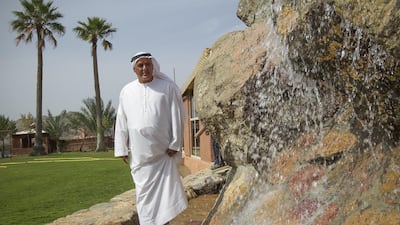RAS AL KHAIMAH // About 20 years ago, Ali Al Mahrazi decided to build a waterfall in his quiet hometown of Masafi.
His father asked him if he was crazy.
“We have five farms, why do you want to make a waterfall?” Mr Al Mahrazi, 55, recalled his father saying.
He now has seven artificial falls on his hilltop property in Masafi, just across from the bottled-water plant.
“I make waterfalls because I love them,” Mr Al Mahrazi said of his property, the Masafi Water Falls and Cave.
The site has become a roadside attraction in the village, which is split between Ras Al Khaimah and Fujairah, 34 kilometres away from Fujairah city.
The town is known for its natural springs, the water plant and the Friday Market stalls selling plants, pottery and carpets that attract tourists and others.
Although the water plant across the street is on the RAK side, Mr Al Mahrazi, a businessman in the electricity industry, declined to say in which emirate his property is, preferring to say the UAE is all one.
He regularly receives people from the town and some tourists, especially on holidays and weekends. Every Friday he invites people from the town for lunch. A visit is free of charge.
“It’s open to all people,” Mr Al Mahrazi said. “We are not looking for money. There are a lot of people who don’t know the Emirates.”
The main waterfall is at the top of the hill, outside one of the houses he has built to accommodate visitors.
He turns it on so the water starts to run down the mountain and into a long drain leading down the hill. Mr Al Mahrazi keeps the water off when there are no visitors, to avoid waste.
Behind the waterfall is a seating area with a view overlooking the RAK part of Masafi, with the town markets, farms and rooftop gardens, and the dark, rocky landscape of surrounding mountains.
He can turn on another waterfall on the hillside in the corner, and an old lamppost jutting from the roof comprises another.
Mr Al Mahrazi likes to trick his guests by using 20 small shower heads that he has secreted in his buildings’ ceilings “to make people laugh” by dripping water over them.
Elsewhere on the property is a football field, playground and natural cave. He keeps chickens, roosters, dogs, doves, rabbits, a donkey and a turkey in pens, which he uses as a small zoo, and gives some of them away as gifts.
The place is a continuing project for him and his five employees, Mr Al Mahrazi said.
“I have no goal of finishing,” he said. “Step by step.”
Mr Al Mahrazi said that he could host as many as 200 visitors in a day, though the gate was closed and the office empty on Tuesday morning. Visitors are sparse in the hotter months.
He is not the only roadside stop in Masafi. Business is slow during most days of the week for the salesmen at the Friday Market on the road to Dubai, a tourist attraction on the Fujairah side of the village.
The market’s plant nurseries, carpet stalls, fruit stands and souvenir shops receive more visitors on the weekend, but a new bypass may be taking some traffic and business away from the shops, said Khasdar Hajikarnal, 25, an Afghani carpet seller from Mazar-i-Sherif.
His Pakistani colleague, Sagar Khan, 27, from Karachi, said business was usually slow, regardless of the bypass.
A weekday may bring in as little as Dh800, Mr Khan said, while they could have enough customers on the weekends to bring in more than six times that.
“It’s difficult,” said Mr Khan, who said he spent six months of the year in the UAE and six in Pakistan.
The quiet in Masafi led Mr Al Mahrazi to leave his town for Dubai years ago to finish his education.
He remembered studying for school by candlelight, and that local schools taught only to Grade 4.
“There was nothing here,” he said.
The Masafi Waterfalls and Cave was his way of giving something back to the place where he grew up, he said.
It also allowed him to use his money for something bigger and longer lasting than a “house or handbag”, to create memories for his townsfolk and those passing through Masafi.
“I want to leave something behind,” Mr Al Mahrazi said.
lcarroll@thenational.ae

